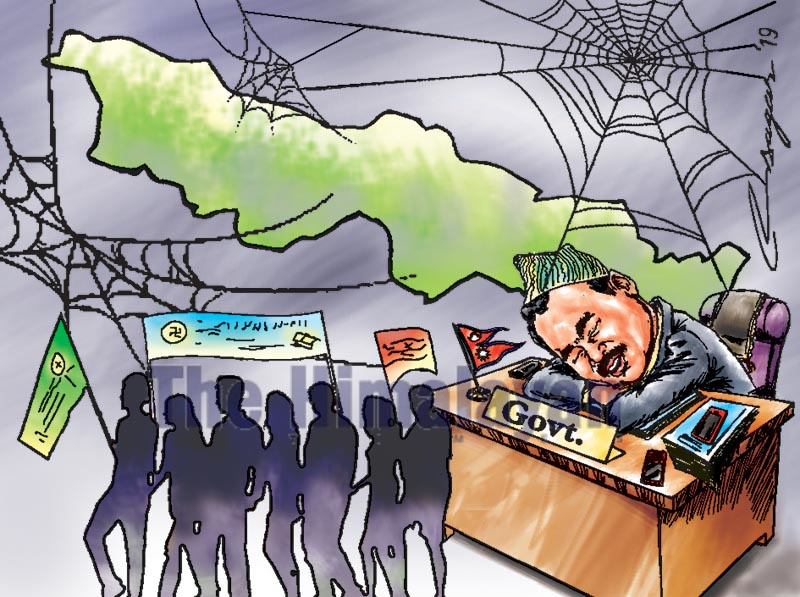Naming Province 2, capital: Why the delay?
The delay also exhibits the incompetence of the provincial government as the issue of the province’s name and its capital is related to its ‘identity’, for which all the three previous Madhesh Andolans were organised
On October 28, 2018, the government of Province 2 formed a three- member Dialogue and Suggestion Commission (Sambad Tatha Sujhao Ayog) with the objective of preparing a report on the name and capital of this province. The formation of the Commission was the most democratic exercise as it focussed on the need to know the people’s perception of the issue.
Initially, one-and-half months were given to the Commission to complete the job, but the tenure was extended to two months. Based on the dialogue with different strata of the society, the Commission completed the report almost a week before it was due for submission to the government. It was not an easy job to initiate dialogue with the different politically divided groups in each of the eight districts on such a sensitive issue as its name and the capital. But as per the mandate given to this Commission, it not only collected individual views on the issue under certain guidelines, but it also served questionnaires to get objective assessment of people’s views.
Opinions of the people in each of the districts differed widely, both in regard to the name of the province and its capital. Some of the most common names of the province suggested were Mithila, Mithila Bhojpura, Videha, Madhesh and Madhya Madhesh. About the provincial capital, a number of suggestions were given, such as Janakpur, Birgunj, Simraungarh, Rajbiraj and Sarnath, even Bardibas.
After collecting views from diverse groups of people, the Commission analysed the data and prepared the report. Yet, the government of Province 2 for reasons unknown kept lingering for months to receive the report. Even after receiving the report, it made very little effort to give the name to the province and its capital.
Recently, the government of Province 2 formed another committee to suggest the name of the province and its capital, although the Dialogue and Suggestion Commission had already dealt with the issue. There is a common perception that the new committee was formed for no other purpose than to linger the process of giving the name and capital of the province. It is not hidden to anyone that delay after delay by the provincial government on the name and capital of the province have been affecting the development activities in Province 2. Over and above, this also exhibits the incompetence of the provincial government as the issue of the province’s name and its capital is related to its ‘identity’, for which all the three previous Madhesh Andolans were organised. Because of this delay, people’s hope in the government has largely eroded.
As per the Constitutional provision, each of the seven provinces in Nepal is free to make a decision on the name and capital, which has to be passed by a two-thirds majority of the respective Provincial Assembly. No timeline is allotted about the time to complete this task. But the delay on this front is embarrassing to the people. It also affects development activities in some way or the other. For example, many of the construction-related activities for the capital is held up because the present capital of Province 2 is temporary.
With regard to the delay made on the name and capital in Province 2, one of the hurdles for the government could be that it does not command a two-thirds majority in the Provincial Assembly to pass the bill. For this, the present coalition government of Samajbadi Party Nepal (SPN) and the Rastriya Janata Party Nepal (RJPN) will need the support of either the Nepali Congress (NC) or the Nepal Communist Party (NCP).
Of the total 107-member Provincial Assembly in Province 2, the NCP has 32 members while the NC has 19 members. The ruling parties - the SPN and RJPN - have 29 members and 25 members respectively. Additionally, there is one independent member, and the Nepal Federal Socialist Party has 1 member. The SPN and RJPN have formed a government in the Province as they have only two seats more than the required number.
Of the seven provinces in Nepal, three provinces, including Karnali, Gandaki and Sudur Paschimanchal, have already identified their names and capitals. On the other hand, Province 1 government has also identified Biratnagar as its capital, though it is still struggling to give the name to the province.
The government of Province 2 cannot escape from its responsibility. Sooner or later, it will have to face the reality in the Provincial Assembly. Before it is too late the government must try to mobilise the support of the Provincial Assembly members to settle the issue once and for all. If necessary, the government could also make the report of the Dialogue and Suggestion Commission public. The real test of the competence of the government lies in how it fixes the name and capital of the province.
In light of the growing frustrations of the people against the government for its failure to deliver on different fronts, the undue delay on the name and capital of the province might prove further counterproductive. If the purpose of the delay on this front is simply to buy time to prolong the life of the government, it could serve the interests of some of those people who are in power. But then the interests of the common people who voted the SPN and RJPN to power will certainly be affected, which could have its reflections during the next elections.
Jha is Executive Director of Centre for Economic and Technical Studies






